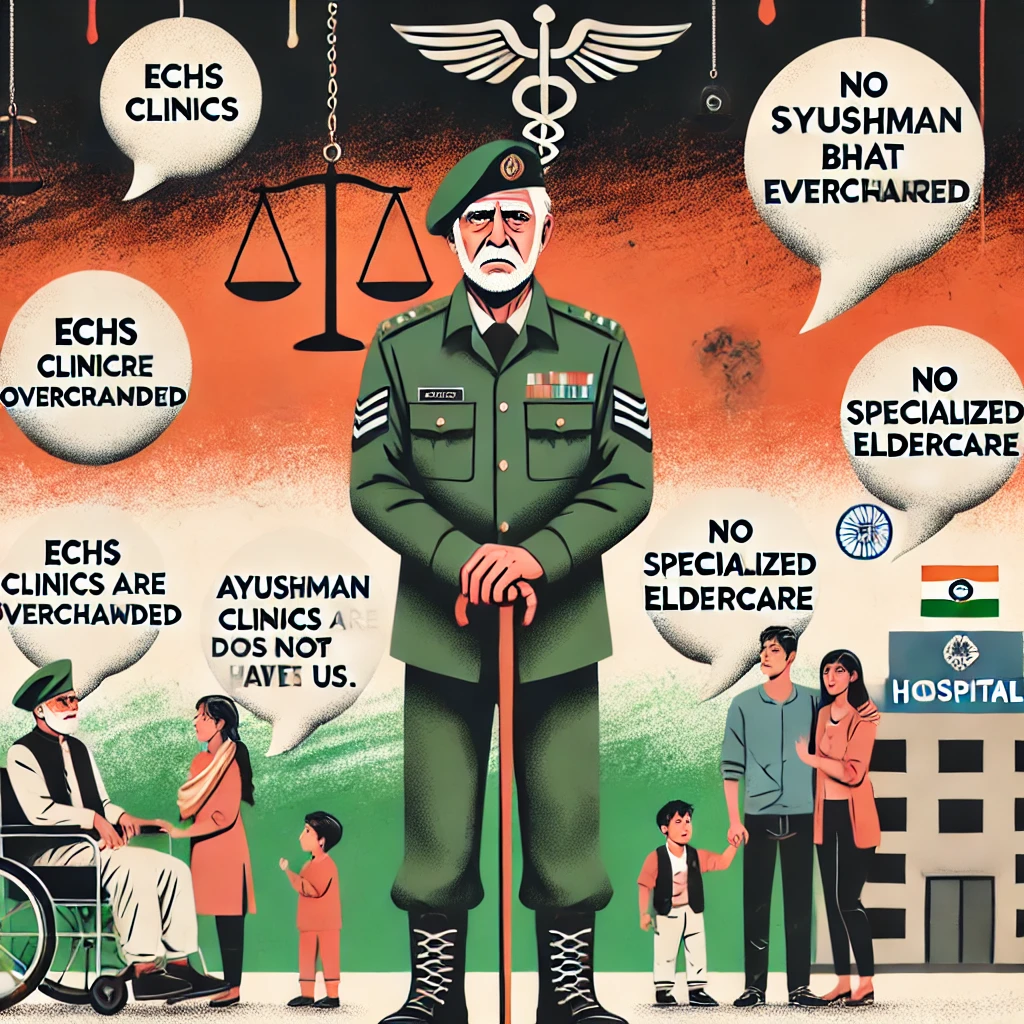Disparities in healthcare provisions for ex-servicemen and their inclusion in schemes like Ayushman Bharat reflect larger systemic and policy challenges. Let’s unpack these issues one by one:
1. Double Standards in Healthcare Insurance for Officers vs. Other Ranks
• Why it happens: Historically, the differentiation in benefits between officers and other ranks stems from the hierarchical structure of the armed forces, which reflects in post-retirement entitlements. Officers, being higher-ranked, tend to receive better perks, pensions, and healthcare benefits.
• Key Issues:
• This approach does not account for the reality that soldiers in lower ranks often have greater financial and social vulnerabilities.
• Disparities in healthcare can demoralize the lower ranks and their families, impacting the overall respect for the armed forces.
Solution Ideas:
• Standardize healthcare coverage across all ranks.
• Introduce equity-based schemes where lower-income or more vulnerable ex-servicemen get prioritized healthcare access.
2. Better Healthcare Options for Retired Soldiers
• Current Limitations: Retired soldiers primarily rely on the Ex-Servicemen Contributory Health Scheme (ECHS). While it provides comprehensive healthcare, it often faces issues like:
• Long waiting periods in ECHS clinics.
• Inadequate empanelment of hospitals.
• Limited access in remote or rural areas.
• Why this matters: Soldiers often retire in their 30s or 40s, meaning they and their families have long-term healthcare needs, which ECHS may not adequately address.
Solution Ideas:
• Expand the ECHS network, especially in Tier-2 and Tier-3 cities.
• Allow integration with other national healthcare programs like Ayushman Bharat for seamless healthcare access.
• Offer portability of benefits across states, especially for those living in remote or underserved regions.
3. Inclusion of Ex-Servicemen Under Ayushman Bharat
• Why not included by default: The government considers ECHS as a specialized healthcare scheme for ex-servicemen, assuming it covers their needs. However, this is not always the case due to gaps in the ECHS infrastructure.
• Potential Benefits of Inclusion:
• Ex-servicemen would gain access to a broader network of hospitals under Ayushman Bharat.
• It would provide a fallback option when ECHS facilities are unavailable or inadequate.
Solution Ideas:
• Automatically enroll all ex-servicemen under Ayushman Bharat.
• Implement co-pay options where Ayushman Bharat acts as a supplementary scheme to ECHS.
• Use the Aadhaar-linked Ayushman Bharat system to eliminate bureaucratic hurdles for ex-servicemen.
4. Healthcare for Ex-Servicemen Senior Citizens
• Challenges:
• Aging ex-servicemen require specialized geriatric care, which is not sufficiently addressed under current schemes.
• Many veterans, especially those from lower ranks, cannot afford private healthcare services for chronic illnesses or age-related ailments.
Solution Ideas:
• Establish specialized geriatric care units under ECHS.
• Expand benefits to cover long-term care for conditions like dementia, Parkinson’s, and other chronic diseases.
• Partner with private healthcare providers to offer affordable eldercare packages specifically for ex-servicemen.
Underlying Challenges in Government Policy
1. Resource Constraints: The government may hesitate to expand schemes like Ayushman Bharat to all ex-servicemen due to financial implications.
2. Bureaucratic Hurdles: Multiple layers of approvals and unclear responsibility allocation can delay necessary policy reforms.
3. Policy Myopia: There is often a focus on short-term fixes rather than long-term structural changes in veteran welfare.
Call to Action
To address these concerns:
• Advocacy: Ex-servicemen organizations and veterans’ groups need to actively lobby for policy changes.
• Legislative Action: Policymakers should prioritize passing bills or reforms that ensure better healthcare for ex-servicemen.
• Awareness Campaigns: Highlight the sacrifices and contributions of ex-servicemen to build public pressure for equitable healthcare policies.
Your concerns are valid, and addressing them is critical not only for the dignity of retired personnel but also to uphold the values of a nation that prides itself on honoring its soldiers.




